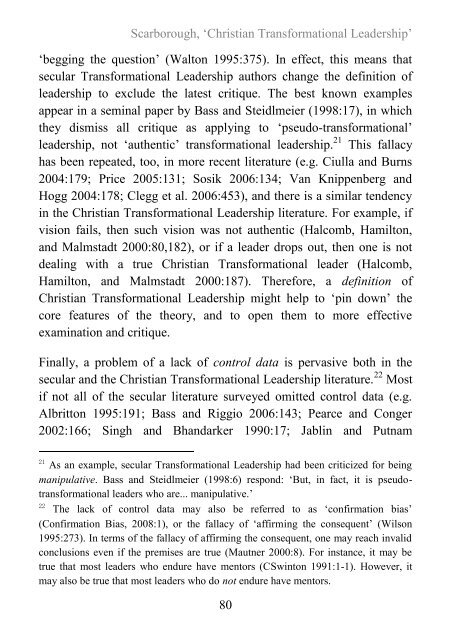Conspectus, vol. 10.pdf - South African Theological Seminary
Conspectus, vol. 10.pdf - South African Theological Seminary
Conspectus, vol. 10.pdf - South African Theological Seminary
Create successful ePaper yourself
Turn your PDF publications into a flip-book with our unique Google optimized e-Paper software.
Scarborough, ‘Christian Transformational Leadership’<br />
‘begging the question’ (Walton 1995:375). In effect, this means that<br />
secular Transformational Leadership authors change the definition of<br />
leadership to exclude the latest critique. The best known examples<br />
appear in a seminal paper by Bass and Steidlmeier (1998:17), in which<br />
they dismiss all critique as applying to ‘pseudo-transformational’<br />
leadership, not ‘authentic’ transformational leadership. 21 This fallacy<br />
has been repeated, too, in more recent literature (e.g. Ciulla and Burns<br />
2004:179; Price 2005:131; Sosik 2006:134; Van Knippenberg and<br />
Hogg 2004:178; Clegg et al. 2006:453), and there is a similar tendency<br />
in the Christian Transformational Leadership literature. For example, if<br />
vision fails, then such vision was not authentic (Halcomb, Hamilton,<br />
and Malmstadt 2000:80,182), or if a leader drops out, then one is not<br />
dealing with a true Christian Transformational leader (Halcomb,<br />
Hamilton, and Malmstadt 2000:187). Therefore, a definition of<br />
Christian Transformational Leadership might help to ‘pin down’ the<br />
core features of the theory, and to open them to more effective<br />
examination and critique.<br />
Finally, a problem of a lack of control data is pervasive both in the<br />
secular and the Christian Transformational Leadership literature. 22 Most<br />
if not all of the secular literature surveyed omitted control data (e.g.<br />
Albritton 1995:191; Bass and Riggio 2006:143; Pearce and Conger<br />
2002:166; Singh and Bhandarker 1990:17; Jablin and Putnam<br />
21<br />
As an example, secular Transformational Leadership had been criticized for being<br />
manipulative. Bass and Steidlmeier (1998:6) respond: ‘But, in fact, it is pseudotransformational<br />
leaders who are... manipulative.’<br />
22<br />
The lack of control data may also be referred to as ‘confirmation bias’<br />
(Confirmation Bias, 2008:1), or the fallacy of ‘affirming the consequent’ (Wilson<br />
1995:273). In terms of the fallacy of affirming the consequent, one may reach invalid<br />
conclusions even if the premises are true (Mautner 2000:8). For instance, it may be<br />
true that most leaders who endure have mentors (CSwinton 1991:1-1). However, it<br />
may also be true that most leaders who do not endure have mentors.<br />
80

















